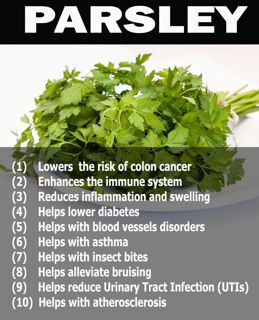
Health and Nutrition Value of Parsley
Parsley is a highly nutritious herb that’s packed with vitamins and minerals. Here’s a breakdown of its health and nutrition value:
Nutritional Content:
Calories: 22 per cup (60g)
Protein: 1.8g
Carbohydrates: 4g
Dietary Fiber: 2g
Sugar: 1g
Fat: 0.5g
Saturated Fat: 0.1g
Polyunsaturated Fat: 0.1g
Monounsaturated Fat: 0.2g
Vitamins:
Vitamin A: 5054.4 IU
Vitamin C: 79.8mg
Vitamin K: 984 µg
Folate (Vitamin B9): 91 µg
Vitamin B-6: 0.1mg
Minerals:
Calcium: 82.8mg
Iron: 3.7mg
Magnesium: 30mg
Potassium: 332mg
Sodium: 34mg
Health Benefits:
Recommended Quantity:
Parsley can be used as a spice in meals, juices, and teas. To maintain freshness, wash just before use and store in a closed container in the refrigerator.
Possible Side Effects:
While rare, some individuals may be allergic to parsley. It should not be consumed by people with severe kidney problems or those who have had surgery within the last month. Pregnant or nursing women should avoid parsley tea or juice.
Remember, while parsley is nutritious, it’s important to consume it as part of a balanced diet. If you have specific health conditions or dietary restrictions, it’s best to consult with a healthcare professional before making significant changes to your diet.
Antioxidant Properties of Parsley
Parsley is renowned for its antioxidant properties, which play a crucial role in maintaining health and preventing diseases. The antioxidants in parsley include:
These antioxidants help combat oxidative stress in the body, which occurs when there’s an imbalance between free radicals and antioxidants. By neutralizing free radicals, the antioxidants in parsley can help reduce the risk of chronic diseases and support overall health1.
Interestingly, dried parsley may have a higher concentration of antioxidants compared to fresh parsley.
One study found that dried parsley had 17 times more antioxidant content than the fresh variety.
It’s important to incorporate foods like parsley into your diet to take advantage of these health-promoting properties. However, always remember to consume it as part of a balanced diet and consult with a healthcare professional if you have specific health conditions or dietary restrictions.
Parsley, a Cure for Urinary Tract Infections
Parsley has been traditionally used as a home remedy for urinary tract infections (UTIs) due to its diuretic properties, which can help flush out bacteria from the urinary tract. Here’s how parsley might be beneficial for UTIs:
Parsley Tea Recipes for UTI:
Simple Parsley Tea:
Boil 20g of fresh chopped parsley leaves in 2.5 liters of water for 5 minutes.
Let it cool down, strain, and drink as a water substitute for one day, every 3 hours.
Parsley Tea with Corn Silk:
Boil 1 tablespoon of fresh chopped parsley and 1 tablespoon of corn silk in 1 liter of water.
Parsley Tea with Chanca Piedra:
Boil 2 tablespoons of freshly chopped parsley leaves and 1 tablespoon of chanca piedra in 1 liter of water.
Precautions:
Parsley should not be used as a sole treatment for UTIs but as a supplement to prescribed medications.
Remember, while parsley can be a helpful addition to UTI treatment, it’s crucial to follow medical advice and take prescribed antibiotics to fully treat the infection. Increasing water intake is also essential to help alleviate UTI symptoms.
Follow Muhammad Mazhar Mushtaq to stay updated on their latest posts!
0 comments
Be the first to comment!
This post is waiting for your feedback.
Share your thoughts and join the conversation.
